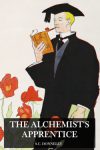
It was not long since after exiting the library that the Bronze Apostate found himself standing at the mouth of a long and narrow hallway. Tetragonal shaped crystals floated atop of brass sconces which lined the two walls. They bobbed gently in place, illuminating the hall and the large portraits which hung between them with a soft white phosphorescence. At the end of the hall was a man-sized sculpture depicting a twin-headed griffon. It stood upright on its hindlimbs atop of a rounded podium, with each head facing outwards opposite the other. Its basalt surface shimmered under the light of the crystals, not unlike the still waters of a midnight ocean under a full moon. The Apostate, leaving no time wasted, marched steadily towards the sculpture.
The portraits loomed over the Apostate as the men depicted within them gazed down with daunting steely eyes. If he had not known better, he could’ve sworn that the eyes followed him—judging him with a malefic prejudice. Each one appeared more puritan than the last as they traced the Del’Mar male lineage to the beginning. But one stood out from the others, and it immediately caught the Apostate’s eye. It was the portrait closest to the griffon sculpture. At first, he did not know why it bothered him, until he read the name inscribed onto the golden plaque: Ignatius Del’Mar. It was out of chronological order; probably at his own behest—wishing to be closer to the sculpture as some twisted form of dominance, the Apostate mused. He looked up at the portrait itself.
Ignatius stared back at him with his shrewd, raven-like eyes. He was dressed in all black, with the only hint of colour being the gold buttons that lined his canvas tailcoat. He struck a proud pose—standing unnaturally straight, resting one hand atop of an ebony black walking cane while the other clutched a journal of sorts close to his chest. For the most part, it was a typical portrait—not much unlike the others here—but what set it apart was the smoky darkness that pervaded the space around Ignatius. For a brief moment, and when hit exactly right by the light of the floating crystals, the Apostate thought he saw the flumes of black coalesce into a crowd of fiendish, bodiless faces— rising like smoke and laughing maniacally. It was gone in an instant, but it was enough to send a cold chill down the Apostate’s spine.
In the distance, there was the all-too-familiar noise of mechanisms latching. The Apostate spun his head to see a guardsman at the mouth of the hall with a blunderbuss loaded and aimed. There was no word of warning—only a silent killing intent with a finger held only hair’s width away from the trigger.
The Apostate had no time to react. The dials of his strange glove suddenly came to life—spinning this way and that, hissing and sputtering arcane energy.
Without hesitation, the guard fired his weapon.
At the same time, the Apostate was in the air—hurtling down the hall towards the guardsman at a dizzying speed. Like a paper plane weighted too heavily on one side he instinctively rolled to the left in an attempt to dodge the rounded projectiles—but the spread was too wide, he couldn’t avoid them.
A flash of searing pain ran down the Apostate’s right arm as multiple projectiles made contact with his shoulder; exploding into shrapnel that tore through his flesh, shredding laps of skin from muscle where they then hung, flapping like pieces of tattered cloth as he soared down the hall.
The Apostate shifted his weight to his ruined shoulder and braced himself.
There was a dull thud as the Apostate crashed into the guardsman, pinning him against the back wall. It was followed by a grotesque, wet crack as the guard’s ribcage buckled from the impact. He coughed and a splatter of blood sprayed the Apostate’s mask. The guardsman’s addled mind questioned in a matter-of-factly manner whether or not the blood came from his lungs or some other organ pierced by his ribs, only to pass out before reaching a conclusive answer.
While still partially collapsed atop of the guard, the Apostate gritted his teeth and willed himself to sit up straight—demanding the fibres of his body to ignore the pain that was now coursing through his nerves. Even if he wanted to, he had no time to assess the damage as he could already hear a cacophony of marching footsteps closing in on him.
Two platoons consisting of eight men each were now running down the halls either side of him; lieutenants littered with superfluous medals barked orders—demanding the death of the Bronze Apostate. To eliminate with extreme prejudice. And the men readily accepted by aiming their weapons at the Apostate.
A dull thrum of distant drums beat in the Apostate’s ears as pain from his collision rang through his head. His thoughts were scattered, always just out of reach. Instinct was now the main guiding voice of his body. He threw his hand down onto the floor. The alchemic dial immediately spun to the correct symbols—as if it knew what the Apostate wanted even before he did—and spued wild arcs of electric-blue energy coursing in messy patterns over the floor. A low rumble emanated below the Apostate, and suddenly two large chunks of the stone flooring—each spanning the width of the hall—rose up like two great graphite monoliths and sealed the two hallways, separated the Apostate from the platoons. There was a distant, muffled series of gunshots and a shout from one of the lieutenants; “Get an alchemist here, now!”
The Bronze Apostate struggled to his feet. His body forced him to take a moment to breathe before he fought back and hastily hobbled down the hall towards the black twin-headed griffon.



